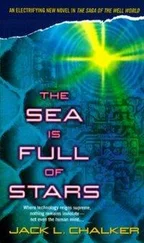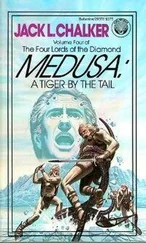“We know all that, Antor,” snapped one councillor. “Get to the point.”
Trelig gave a killing glance, then continued. “Now, the artifacts they left us when they died out or disappeared over a million years ago consist entirely of ruined structures—buildings. No furniture, no machinery, no utensils, no objects of art, nothing. Why? Generations of scholars have mused on this, to no avail. It seemed as insolvable a mystery as why they died out. But one scientist, a Tregallian physicist, had an idea.”
They stirred slightly, nodding. They all knew who he meant.
“Dr. Gilgam Valdez Zinder,” Trelig went on, “thought that our failure to solve the Markovian riddle stemmed from our too orthodox view of the universe. First, he postulated the concept that the ancient Markovians did not need artifacts because, somehow, they could convert energy into matter merely by willing it. We know that deep beneath the crust of each Markovian world was a semiorganic computer. Zinder believed the Markovians were directly, mentally linked to their computers, which were, in turn, programmed to turn any wish into reality. So he set to work on duplicating this process.”
There were murmurings now. Trelig was confirming the rumors that had brought them here, rumors too horrible to believe.
“From this point, Zinder went on to postulate that the raw material they used for this energy-to-matter conversion was a basic, primal energy, the only truly stable component in the universe,” Trelig explained. “He spent his life searching for this primal energy, proving its existence. He worked out its probable nature mathematically, designing his own self-aware computer to help him in this end.”
“And he found it,” a woman who looked no more than a child but was an elder of a Com race interjected.
Trelig nodded. “He did. And, in the process, produced a set of corollaries that are staggering in their implications. If all matter, all reality, is merely a converted form of this energy, then where did we come from?” He sat back, enjoying the expressions on the faces of those who were able to grasp the implications.
“You’re saying the Markovians created us?” the red-bearded man called out. “I find that hard to accept. The Markovians have been dead for a million years. If their artifacts died with their brains, why didn’t we die, too?”
Trelig’s face showed surprise. “A very good question,” he noted. “One with no clear answer, though. Dr. Zinder and his associates believe that some sort of massive central computer was established, somewhere out there among the other galaxies, that keeps us stable. But its location is neither here nor there, since it is almost certainly beyond our capability to get there in the foreseeable future, even if we knew where ‘there’ is. The important fact is that such a computer does exist, or we wouldn’t be here. Of course, it allows, shall we say, local variations in the pattern. If it didn’t, then the local Markovian worlds would never have been able to use their own godlike computers. And, what they could do Dr. Zinder has discovered how to do! It is the ultimate proof of his theories.”
Several in the audience looked uneasy; there were a couple of nervous coughs.
“Do you mean, then, that you have built your own version of this god machine?” Mavra Chang asked.
Trelig smiled. “Dr. Zinder and his associate, Ben Yulin, the child of a close associate of mine from Al Wadda, have built a miniature version of it, yes. I persuaded them to move their computer here, to New Pompeii, where it would not fall into the wrong hands. The timing was perfect. They were just completing the hookup of a much, much larger version of the machine as well.” He stopped a moment, frowning slightly, but his overall expression was playful.
“Come with me,” he invited them, rising from the table. “I see disbelief and skepticism. Let us go to Underside and I’ll show you.”
They all got up and followed him out the entrance, across the grassy plaza, and toward a small structure that looked something like a solid marble gazebo, off by itself to the left.
Although its housing was built to blend with the Neo-Grecian and Roman architecture, it was clear when they reached the little house that it was some sort of high-speed elevator.
Trelig selected a smooth, bare area and placed his hand, palm down, on it. His fingers tapped out a pattern too rapid for any of them to catch, and, suddenly, the wall faded, showing the interior of a large high-speed car. There were eight seats with head rests and belts in it.
“We will have to make two trips,” Trelig apologized. “The first eight of you, here, please take the seats and fasten the straps. The descent is extremely fast and very uncomfortable, I’m afraid, although some gravity compensation has been built in to minimize the effect. Once the first group is away, the smaller maintenance car can be used for the rest of us. Don’t worry—there’s a two-level exit on Underside.”
Mavra was in the first group. She took a chair, relaxed, and fastened the straps. The door, actually some sort of force field with a wall projection over it, solidified again, and they felt themselves dropping quickly.
The trip was uncomfortable; small plastic bags had been provided for the two or three who needed them. Mavra was amazed at the little car system; she’d heard of such a thing but had never seen one, let alone been in one. They had been designed for a few of the planets whose surfaces were uninhabitable but where, for one reason or another, life at levels below the surface was possible.
It took over ten minutes to reach the other end, and, even at that, they traveled at a tremendous rate of speed. Finally they felt the car slow, and then crawl to a stop. They waited three or four minutes, nervously wondering if they were stuck. Then they heard the sound of something above them, and, less than a minute later, the force field and solid projection in front of them dissolved, and Trelig was there, smiling.
“Sorry about the delay. I should have warned you,” he said cheerily, sounding not the least bit sorry.
They unbuckled their belts and got up, stretching, and walked out into a narrow corridor. They followed their host down the steel-clad pathway. It turned and ended on a large riveted metal platform with railings all around. Ahead of them was an enormous shaft that seemed to have no top or bottom. The size of the round gap dwarfed them to insignificance, and they gasped in awe. All around the shaft were panels, countless modules with even, small gaps between.
A long bridge led from the platform across the shaft; a wide bridge of the same metal flooring as the platform but with 150-centimeter sidewalls of a plastic substance. They realized that they were somewhere in the bowels of a great machine.
Trelig stopped in the middle of the bridge, and had the party gather around him. Everywhere, were the hum and crackle of active circuits opening and closing, echoing off the shaft walls. He had to raise his voice to be heard.
“This shaft runs from a point about halfway between the theoretical equator and the South Pole of New Pompeii on the rocky and unprotected surface, almost to the core of the planetoid,” he shouted. “It is fusion powered, indirectly, through the solar and plasma network. For almost twenty kilometers in all directions around us is the computer—self-aware of course—which Dr. Zinder calls Obie. Into it we have been pouring all of the data at our command. Come.”
He continued the dizzying walk, past a shining copper-colored pole that ran lengthwise through the center of the shaft and seemed to disappear in both directions, and onto a platform identical to the first one. To their left a window opened on a large room filled with myriad apparently inactive electronic instruments. A door like that of an airlock stood directly before them. When it slid open with a hiss, there did in fact seem to be a slight change in pressure and temperature. They entered and found themselves in what seemed a miniature duplicate of the larger machine. A balcony and several control consoles surrounded an amphitheaterlike floor below, on which was a small, round, silvery disk. Overhead, what looked like a twenty-sided mirror with a small projecting device in its center was attached to a mobile arm that was suspended from a mount on one wall.
Читать дальше












